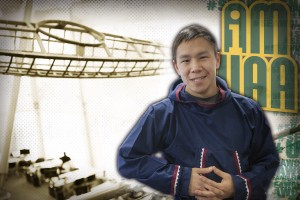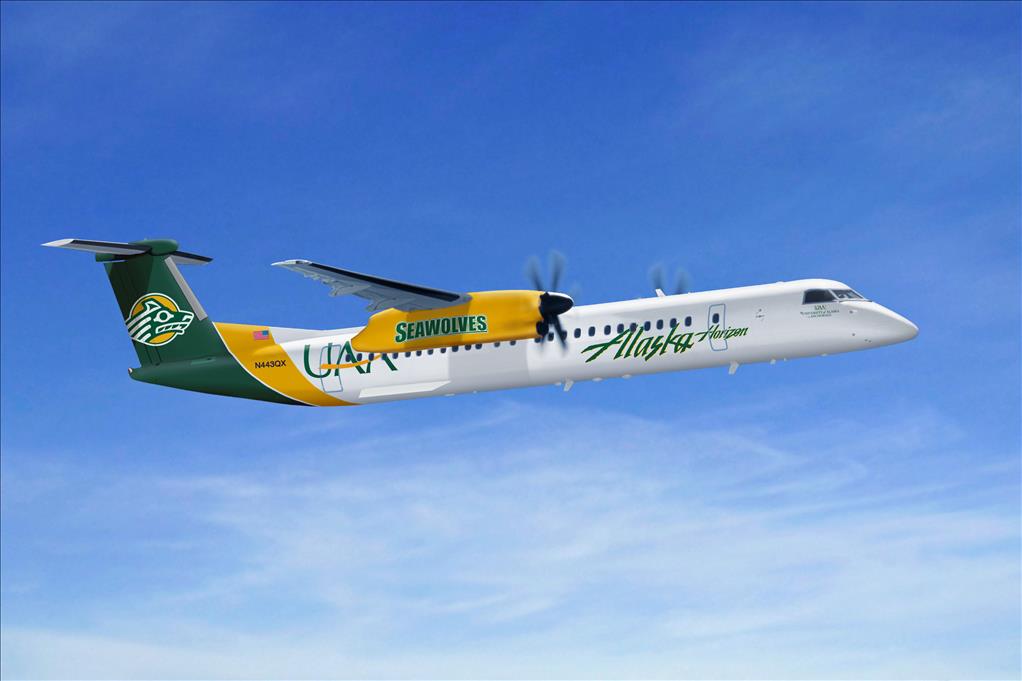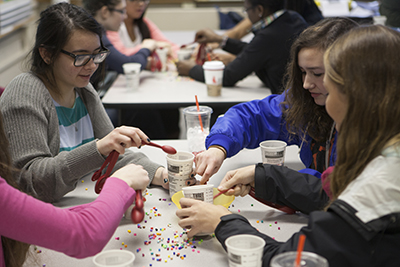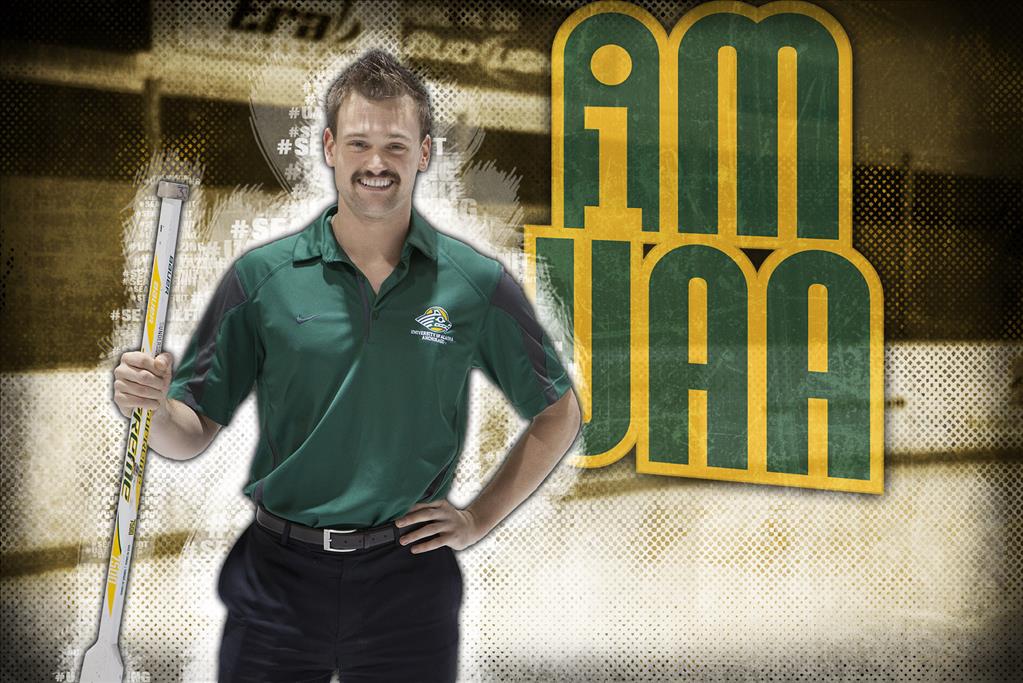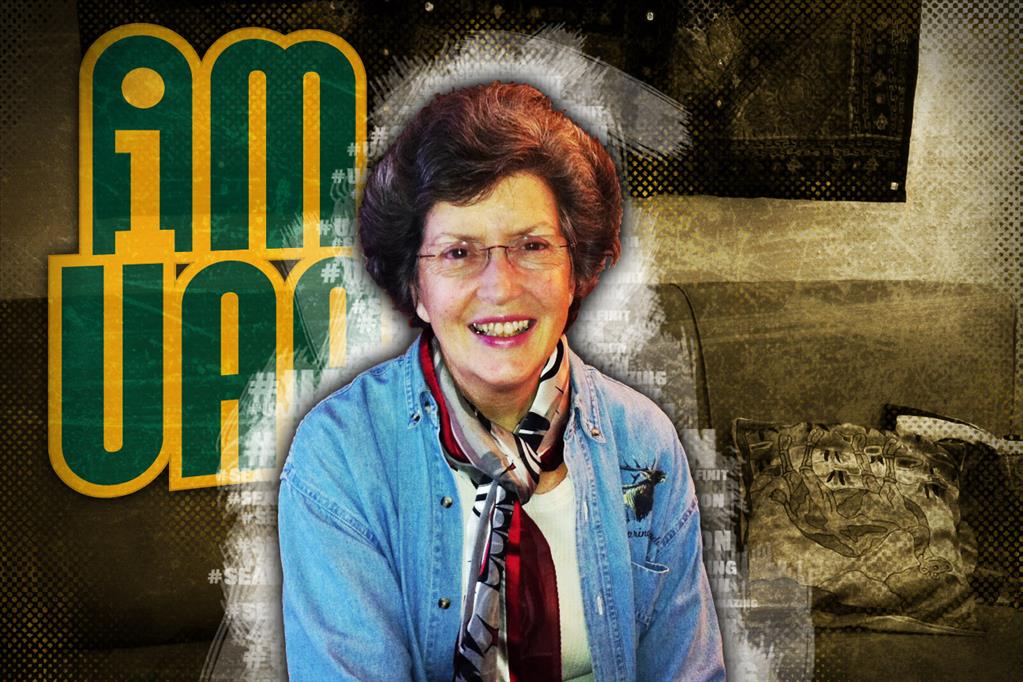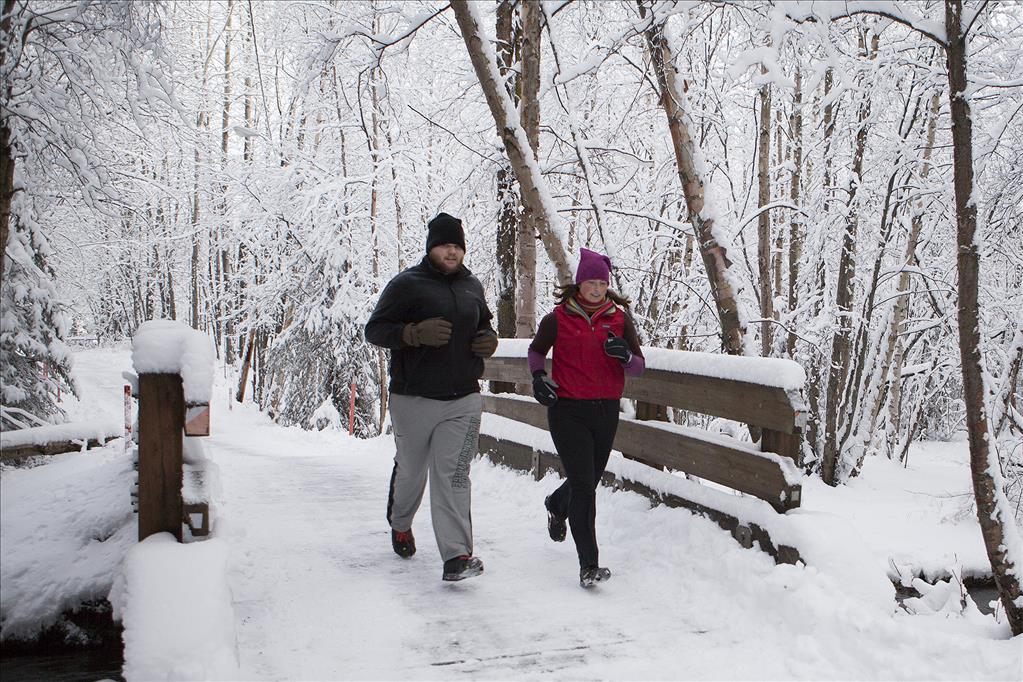Student Spotlight: Michael Ulroan
by Jamie Gonzales |
Major: Civil Engineering, Class of 2014 Hometown: Chevak, Alaska Fun Fact: President of UAA's American Indian Science and Engineering Society (AISES) chapter
Run past that point where you're tired. Run until you've surrounded yourself with the people you want to be. Cross the finish line together. This is Mike Ulroan's life.
"There's only one thing I really know. You don't give up," says Mike. "If you want something and it's important to you, you won't give up."
In May, after eight years, he will accept his hard-earned degree in civil engineering.
The power of a story
Last month marked the eight-year anniversary of an important victory. Mike and his cross country running teammates in Chevak-a rural Cu'pik Eskimo village of about 1,000 in Western Alaska-had just run their hearts out to claim their fourth regional championship in a row. The Anchorage Daily News ran a story about his team that caught the eye of Cathy Rasmuson of the Rasmuson Foundation.
"She called my running coach and said she felt really moved by the story and she wanted to pay for three seniors to go to college," says Mike.
He emailed Cathy and said he'd like to be a civil engineer, not quite knowing what it was they did. He'd seen a list of careers and average salaries and that one fell near the top. She replied and urged him to consider going to college in Alaska if engineering was what he was truly interested in. She knew a great place to introduce him: UAA's Alaska Native Science and Engineering Program (ANSEP).
Starting at the back of the pack
Mike always knew he wanted to follow in his mom's footsteps and go to college. She left the village to earn her teaching degree in Portland, Ore., as a young woman, returning to work in Chevak as an elementary school teacher for 35 years.
"I saw the benefit in a higher education," he says.
In high school, Mike tried to push himself academically. As a senior, he tried to teach himself pre-calculus. Good math teachers, he said, were hard to come by in their small village. Ditto for science teachers.
"We didn't have chemistry or physics offered in my school," he says. And there was only so much you could learn reading a textbook and trying to work out problems on your own.
Before he could start classes at UAA, he went through a round of placement tests.
"I was placed into elementary algebra, preparatory reading, the basic ground level of what they offer here. It was general addition and subtraction," he says. "I thought, I guess this is where most students start. I thought it was common."
Then he met other science and engineering students in ANSEP and they were talking about their calculus, physics and chemistry classes.
"I felt really embarrassed. I shied away from talking to other students," he says. "I was just ashamed of my educational level compared to other freshmen students."
In his experience, it's tough for people who have no experience living in rural Alaska to comprehend an 18-year-old being academically and socially unprepared for college, Mike says.
"They're like, 'How can you be unprepared socially or academically?' But when you're that isolated and there are not that many educational opportunities, it's a whole different story," he says. "It's something that can only be explained by experience."
'It's not a race.'
"I'll be done in May. I'll get my degree, but it will have taken eight years, twice as long as what it should take," Mike says. In a way, he's grateful that it's taken him that long. It's his long-term career goal to show other students from rural Alaska that they can do anything they want and that there are people who will help them if they're struggling.
"Herb [Ilisaurri Schroeder] the founder of ANSEP, after I told him I'd failed chemistry, said, 'Well, you have to take it again. It's not a race.'"
For three years Mike struggled to catch up, failing classes, not connecting with other students and asking for the help he needed. ANSEP helped turn the tide.
"I started going to meetings and putting myself in situations where I had to interact. As that became more normal, I started passing my classes," he says.
"I learned you can do what you want if you work together. It doesn't matter what your background is, it doesn't matter where you came from. It's not just your history, it's about what you want. It doesn't matter how long it takes."
Living among inspiration
For the last four years, Mike has been surrounding himself not just with the people who help him to be his best self, but also with the ideas and words of people who inspire him. Tacked on his apartment walls are quotes from people he admires.
"My philosophy is, if you see it, it becomes not just something you read, but something you are," he says. "The two most important that I have are hanging on my door. They're quotes from my parents."
In a family with five kids and two parents who worked at the school in Chevak, mornings could be a little chaotic at the Ulroan house, but there's one moment that stands apart. The older kids had already left for school with his mom so a young Mike, kindergarten or first grade, along with his dad had a quiet house to themselves.
"I remember eating breakfast and my dad, who was the maintenance worker at the school, before he left came and knelt by me and said, 'I want you to go for being the best at everything you do,' and then he walked out the door."
That thought is pinned to Mike's door beside the words of wisdom from his mom.
"During one of my toughest semesters, I was constantly staying up until 2 or 3 in the morning and waking up at 7 or 8 to get to class, not getting too much sleep, getting frustrated and tired," he says. So he called home.
His mom, who had overcome her own struggles to earn a college degree said, "If you want something that will benefit you for the rest of your life, you have to make a lot of sacrifices."
Those are the last words he sees as he leaves his apartment to head to campus.
Crossing the finish line
"Hard times, that's a given in life. Everybody is going to go through a hard time, but the willingness to keep moving forward, that's a choice," Mike says. "You make the decision."
These days he is immersed in the typical senior course load for engineering students, which is to say he has a very full plate.
Mike laughs at the mention of holiday breaks. What Thanksgiving Break? He has five projects due. But his eyes light up when he talks about them. Christmas Break is when he'll get to start working on his capstone senior project, engineering a suspension bridge for Byers Lake.
"I've been excited for these classes for the past two years. Now that I'm here, I'm excited I'm finally taking engineering courses. This is it. These structural civil engineering classes are what I originally set my mind to. Now that I'm here there's that sense of accomplishment," he says, but he's quick to share the spotlight.
"I didn't learn this on my own. We all did it. Everybody did it. That's how working together should be, a sense of togetherness, a family. You need a family to do good stuff."
Learning about endurance
Running has been a big part of Mike's life. It's the reason his high school coach got that fate-changing phone call from Cathy Rasmuson and the reason he chose the academic path he's about to complete.
"Running has taught me a lot. Mentally and physically it's taught me to keep going even though you're tired," Mike says.
Now it provides stress relief and reminds him a little of home.
"Home is where I was raised to be who I am today. I'm proud of my village, of Chevak. I'm proud to say I'm a Cup'ik Eskimo from Chevak. You gotta be proud of where you're from."
For the last two years engineering internships with Alaska Native Tribal Health Consortium (ANTHC) have sent him home to Chevak for projects. When the projects are completed he always tries to make time to go hunting and fishing. Besides family and friends, it's what he misses most about home.
With graduation looming, Mike is thinking about his future. He would welcome a full-time position with ANTHC or within the engineering industry anywhere in Alaska. Knowing what he's capable of achieving now, he's also set his sights on graduate school for engineering management. His ideal future would be a full-time job that uses his degree and experience paired with part-time graduate study.
"I really want people to see that you can do what you want. It doesn't matter who you are, where you're from, what you've been through. As long as you don't give up, you keep going, you can do anything you want. That's why I'm still going."
 "Student Spotlight: Michael Ulroan" is licensed under a Creative Commons Attribution-NonCommercial 4.0 International License.
"Student Spotlight: Michael Ulroan" is licensed under a Creative Commons Attribution-NonCommercial 4.0 International License.










